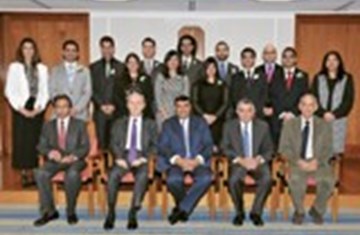IIS Publishes Nasir-i Khusraw’s Jami‘ al-Hikmatayn in Tajik
The Central Asian Studies unit of the IIS, in collaboration with the Institute of Oriental Manuscripts (IOM) of the Academy of Sciences of Tajikistan (AST), has published a new Tajik edition of Nasir-i-Khusraw's Jami‘ al-Hikmatayn (Twin Wisdoms Reconciled). This new critical edition, prepared by Professor Karomatullo Olimov who is the Director of IOM and Vice-President of the AST, is supplied with an introduction and extensive vocabulary which makes it accessible to a wider Tajik readership.
Jami‘ al-Hikmatayn is considered to be the final work of Nasir-i Khusraw, which was written in Yumgan, Badakhshan in 1069-70 CE. In the introduction to this work, Nasir-i Khusraw highlights that the philosophical treatise was written at the request of the ruler of Badakhshan, Ain al-Dawla Ali Ibn Asad al-Haris, whom he described as an ‘open-minded, intelligent, perceptive, observant, talented, positive, well-mannered person who has a thirst for knowledge’. Ain al-Dawla requested Nasir-i Khusraw to provide a commentary for a qasida by Ahmad ibn Al-Hasan al-Jurjani where he raised many questions about creation and the variety of manifestations and forms in both the material and spiritual world.
Nasir-i Khusraw accepted the request and was delighted that ‘in a world where the majority of people have turned their face from the true religion (din-i haqq), the market of wisdom has stagnated, and the nature of people of sharia has been corrupted, I have found a great person who understands both the worldly and religious authority’ – referring to his patron Ain al-Dawla.
Nasir-i Khusraw’s elaborations in Jami‘ al-Hikmatayn are profound and go beyond simple answers to the questions which are raised in the qasida. In his work, he alludes to various philosophical schools of antiquity and juxtaposes them with the ideas of Muslim philosophers about God and his manifestations. As a result, he attempts to synthesise a religious philosophy which is grounded in logic and substantiated by Qur'anic exegesis.
In this treatise, Nasir-i Khusraw demonstrates his in-depth understanding of Greek philosophy, various philosophical trends of pre-Islamic and Islamic thought, and the contradictions as well as commonalities in their teachings. He seeks to reconcile philosophy and Islam, with particular reference to the Ismaili tradition, which becomes apparent in his response to questions about the Oneness or tawhid (unity) of God, the creation, nature, angels and demons, the body, soul and intellect. Aql (intellect), in Nasir-i Khusraw’s view, is the uppermost quality which God has bestowed on human beings. It is, according to him, ‘what governs the body and soul’.
Jami‘ al-Hikmatayn is a valuable resource for those interested in the history of philosophy, Islamic theology and Ismaili teachings. It is also an important text for those studying the Tajik language, particularly terminology used in philosophy and science. This edition will be of use to scholars and students studying Islamic philosophy and the dynamics of intellectual discourse which prevailed in the medieval Islamic world.
Jami‘ al-Hikmatayn is the third in a series of publications of Nasir-i Khusraw’s work following Zad al-Musafirin (The Nourishment of the Wayfarers) and the Diwan (in two volumes) of poetry. Nasir-i Khusraw’s Khwan al-Ikhwan (The Feast of the Brethren) is a forthcoming publication in this series.






